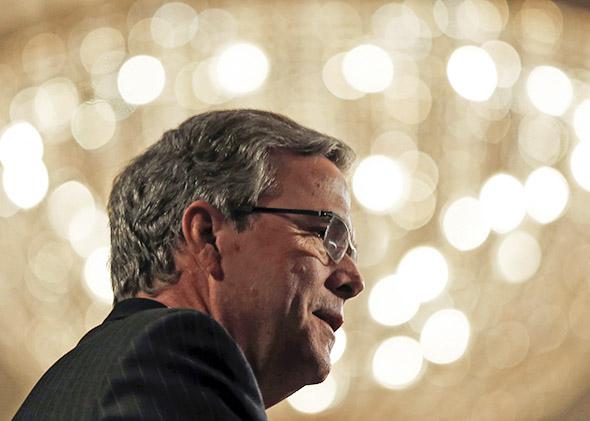If there were questions about whether Jeb Bush is like his brother, he dispelled some of them on Wednesday at the Chicago Council on Global Affairs. In November 1999, candidate George Bush scored only 25 percent when a Boston television political reporter gave him a pop quiz on world leaders. Jeb Bush, on the other hand, displayed a command of the world on topics from Cuba to ISIS to the relationship between energy and American security. He surpassed his brother at a far earlier period in this cycle. He also surpassed his 2016 rivals Govs. Chris Christie and Scott Walker, who have had trouble clearing the foreign policy hurdle easily.
Jeb Bush may or may not have wise opinions, but as David Axelrod writes in his recent book about Barack Obama’s 2008 presidential race, a candidate can convey strength by passing confidently through the tests on the campaign trail. For some voters that may be enough. Bush showing he knows the name of the president of Egypt, can correct his questioner about events in Tunisia, and can name the precise location of the Iraqi prison that once held the current leader of ISIS will be sufficient. More important for the coming Republican primary, Bush was optimistic. “We are a country in its ascendancy,” he said. “We just need to start acting like it.” If sustained, confidence mixed with optimism is an attractive combination in a candidate.
But this is only the start of what hopefully will be a long investigation into what Bush really thinks about foreign policy. What exactly would he have done differently in Syria or in response to Russian intervention in Ukraine? Do those answers represent the bold new way forward he suggests, or are they mere tinkering? Did he mean to criticize members of his brother’s administration who came to the same conclusion about Iran retaining levels of enriched uranium when he attacked the Obama administration for holding the same position?
He says a lot of things confidently, which makes it look like he’s not getting up on roller skates for the first time—but like most “policy speeches” it was mainly a chance to criticize the sitting president. His speech and answers on Wednesday, with only a few exceptions, were vague and rich in platitudes. He’d like the economy to be strong and for America to have strong alliances and promote freedom. He said an American president must speak in bright certainties and always do what he says—unlike Obama on Syria, which Bush pointed out, but also unlike Bush on North Korea’s nuclear capability, which he didn’t. He wants America to lead everywhere and be engaged but also several times counseled “patience.” He wants to increase defense spending, but didn’t specify how he is going to do that while balancing the budget, tackling entitlements, and promoting the 4 percent growth he promises. He promotes a “Liberty Diplomacy” (which sounds like his brother’s Freedom Agenda), but when asked about Egypt—where an oppressive dictator maintained stability despite the calls for freedom from people in the streets—Bush suggested the United States made the wrong call abandoning Mubarak. He called for “balance,” which would have meant putting the promotion of liberty on hold. At another point Bush said that when he looks at the world’s complexity and dangers he says to himself, “Holy Schnikies. This is serious stuff.”
Here’s the bottom line: In foreign policy positions and posture, Jeb Bush is indistinguishable from his father or brother because he’s indistinguishable from the general GOP line. If he is challenging the Republican Party on domestic issues, he’s not doing anything to challenge Republicans on foreign policy. His positions are indistinguishable from all but Sen. Rand Paul in the GOP’s 2016 field. No doubt Paul will be attacking him shortly, as Bush articulated the mainstream Republican view on surveillance. He said the National Security Agency’s metadata collection is “a hugely important program.”
In his speech, Bush made it seem like a media fixation to compare him to his brother or seek to measure the distance between the two. But it’s natural to compare a candidate to what has come before, no matter who bears the name. When talking about Republican foreign policy thinking, it’s natural to think about the last two Republican presidents, both of whom happened to be named Bush. They define a huge chunk of the Republican foreign policy world. Look at the list of foreign policy advisers Jeb Bush has supporting him, and this is borne out. They have more experience with Bushes than the gardeners at Levens Hall. So when Jeb Bush tries to treat attempts to get him to weigh in on the policies of his brother and father as unfair, he’s asking to be exempted from having an opinion about 12 years of Republican decision-making.
On Wednesday, Bush only mentioned Iraq by mistake, but in the question-and-answer session he returned to the country. “There were mistakes made in Iraq, for sure,” he said, pointing out that the information the intelligence community in multiple countries provided on weapons of mass destruction turned out “not to be accurate.” He also said that not planning to secure Iraq after Saddam Hussein was removed was a mistake. They were the first remarks he’s made about his brother’s war in Iraq since he’s started seriously running. He also said that George Bush’s support for the surge was “heroic” and “hugely successful.”
For those scoring at home, this is no different than what his older brother said in his book Decision Points, though Jeb Bush did distance himself from his brother in one way. He went much farther than George Bush did in praising George Bush’s performance with the surge.
